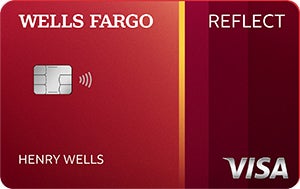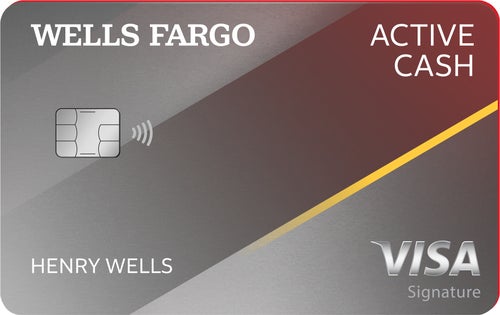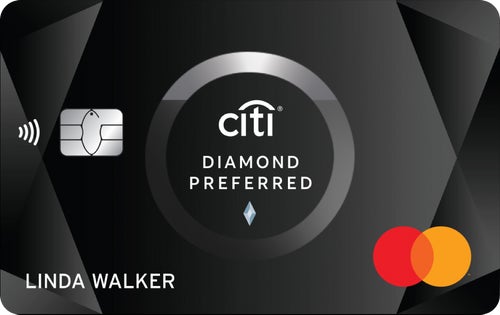- Intro Offer
-
No current offer
- Annual fee
- $0
- APR
- 18.24%, 24.74%, or 29.99% Variable APR
- Recommended Credit A credit score is used to indicate an applicant’s credit worthiness and may provide guidance about account eligibility. It does not necessarily guarantee approval for any financial product.
-
670 – 850
Good – Excellent
- Rewards rate
-
N/A This card doesn’t offer cash back, miles, or points
The Wells Fargo Reflect® Card offers a very long introductory APR, making it a great choice if you’re looking to finance a large purchase or transfer a balance from a card with a high APR.
Through the promotional offer, you’ll get 21 months from account opening of 0% introductory APR on both purchases and qualifying balance transfers (then 18.24%, 24.74%, or 29.99% variable APR thereafter), so long as you make any transfers within 120 days from account opening (balance transfer fee of 5%, with a $5 minimum). There is no annual fee with this card, so by using it responsibly, you can continue to build your credit even after the promotional APR period is over.
The Wells Fargo Reflect Card is quite specialized: If you’re looking for cash back or travel rewards -- or your credit isn’t great -- you’ll have to look elsewhere. Read on to learn more about the details surrounding the intro APR and balance transfers, as well as some recommendations for supplementary cards and potential substitutes.
Introductory APR on purchases
With the 0% introductory APR offer on purchases for 21 months from account opening, this card is one of the best on the market in that category. Any purchase you make in the first 21 months will have no interest applied as long as you pay the minimum monthly payments on time.
Just keep one thing in mind -- at the end of the promotional period, your APR will hike up to 18.24%, 24.74%, or 29.99% variable. That means it’s best if you plan to pay off your balance in full by the end of the promotional APR period so you don’t rack up any interest. You can do this as a balloon payment at the tail end of the promotion, as equal monthly payments or anything in between -- as long as you’re hitting that monthly minimum payment along the way.
Making a balance transfer
You also get a 0% introductory APR on qualifying balance transfers for 21 months from account opening (18.24%, 24.74%, or 29.99% variable APR thereafter). Making a balance transfer onto such a card is a great way to consolidate your debt and avoid interest charges.
To qualify for the introductory APR on your qualifying balance transfers to the Wells Fargo Reflect Card, you’ll have to request the balance transfer within 120 days of account opening.
You’re best off initiating a balance transfer request as soon as you get your card, because the promotional clock starts ticking when your account opens. For instance, if you wait three months to initiate your balance transfer, you’ll only get the remaining 18 months of introductory APR.
As for the balance transfer fee, it’s one of the highest around -- 5% on balance transfers with a $5 minimum, for any balance transfers made. The bottom line: If you’re getting this card specifically to make a balance transfer and temporarily escape a higher interest card, only apply for it once you’re ready to make the transfer.
Other perks
There aren’t many other perks with this card -- its strength is the introductory APR.
There are, however, a few small benefits that may be of interest to some. You’ll get up to $600 in cell phone protection -- that is, reimbursement in the case of damage or theft to the phone -- if you pay your cell phone bill with this card. (There is a $25 deductible.)
Another perk is the “My Wells Fargo Deals” you can opt for via your account. Select merchants may offer special deals for Wells Fargo credit card users, like cash-back promotions (in the form of an account credit). These deals will all be subject to their own terms and expiration dates.
Comparable cards
Wells Fargo Active Cash® Card
Many credit cards with introductory APRs on purchases also allow you to earn rewards on those transactions. While the Wells Fargo Active Cash Card has a considerably shorter introductory APR period, the 2% cash rewards rate on purchases is likely to sway many shoppers. The welcome bonus is another perk -- you can earn a $200 cash rewards bonus when you spend $500 in purchases within the first three months.
Check out our full review of the Wells Fargo Active Cash Card for more details.
Citi® Diamond Preferred® Card
The Citi Diamond Preferred Card* also offers one of the longest introductory APRs -- on balance transfers, at least. You get an introductory 0% APR on balance transfers for 21 months from the date of the first transfer, while you get a less-impressive 0% introductory APR on purchases for 12 months from the date of account opening (18.24% to 28.99% variable APR, thereafter). Balance transfers must be completed within four months of account opening. However, it too carries a 5% balance transfer fee with a $5 minimum on all balance transfers.
See more details in our full review of the Citi Diamond Preferred Card.
How Wells Fargo Reflect® Card compares to other cards
FAQs
The introductory APR is the annual percentage rate applied toward your balance (including balance transfers and purchases in most cases) for the first 6 to 21 months of card ownership, depending on the card. The standard APR is the annual percentage rate applied toward your balance after the introductory period ends. The penalty APR is applied toward your balance if you miss more than one payment in six months usually, but it depends on the individual card and your card issuer.
It may take anywhere between 10 days and six weeks to complete a balance transfer, after receiving your new card and cardholder agreement. It’s also important to note that some card issuers, such as Citi, make balance transfers available at their discretion, and could therefore decline a transfer request. And you should probably still pay the minimum on the old card’s balance until you’ve confirmed that the transfer was completed, so you don’t run the risk of fees or penalties.
Technically, yes. In some cases, transferring your balance two or three times might even be what’s necessary to finally pay off your debt. But unless you have a firm understanding of how you got into debt in the first place and a plan for getting out of debt, you won’t be working toward a solution.
While transferring your remaining debt to a second balance transfer card may allow you to pay off your balance without monthly interest or a fee, it’s important to note that there are too many variables for multiple balance transfers to be a failure-proof debt strategy.
For example, your card application could be denied, your credit limit could be much lower than you anticipated or your transfer request could be denied. Credit card offers could also change, making it difficult to plan ahead. For this reason I recommend selecting a card that allows you to pay off the full balance after one cycle if possible.
Our approach
We review the cards that are in the highest demand and offer the best benefits. We scour the fine print so there aren’t any surprises when you open an account. We find the key factors that make a card stand out and compare them to other top cards. That way, readers can opt for a different card with similar features if our pick isn’t right for them. Our reviews are regularly checked and updated to incorporate new recommendations, as well as to reflect changes in offers and the market.
*All information about the Citi Diamond Preferred Card has been collected independently by CNET and has not been reviewed by the issuer.
The editorial content on this page is based solely on objective, independent assessments by our writers and is not influenced by advertising or partnerships. It has not been provided or commissioned by any third party. However, we may receive compensation when you click on links to products or services offered by our partners.



